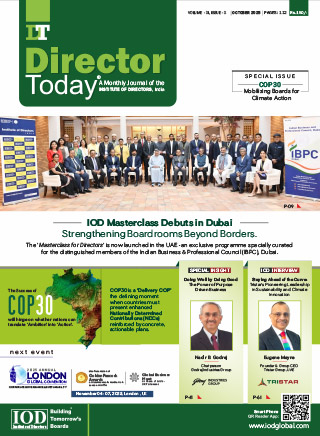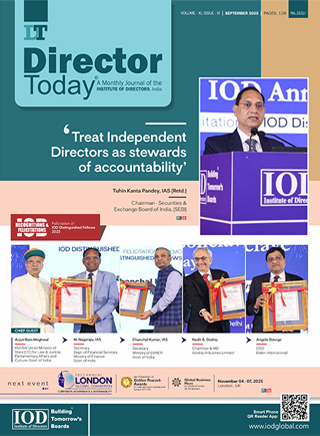Investors should prioritise Substance over Form when pressing for Board Independence

Is a board composed entirely of independent directors superior to a board with only insiders? Can we identify an optimal board structure that works for every company and in every circumstance? Over the past years, governance experts have attempted to answer these questions, often unsuccessfully. The trick is that there are not many universally accepted answers when it comes to corporate governance. Governance quality is strongly dependent on context and box ticking compliance can negatively impact decision making and firm value.
We can better understand this by examining the board of Lehman Brothers in the years before the company collapsed. Many commentators have pointed to the poor oversight by Lehman's board as a major cause of the company's bankruptcy in September 2008.
From a structural point of view, there was nothing unusual in Lehman's board. It was unstaggered and with a majority of independent directors. A box ticking evaluation of Lehman's governance quality would have not raised any red flags. This is confirmed by the very high governance rating that Lehman received from Institutional Shareholder Services, a leading proxy advisor, fourteen days before it filed for bankruptcy. However, from a more subjective standpoint, Lehman's board was lacking engagement and expertise to understand the risks that the company was undertaking. At the Congressional hearing on the financial crisis, Lehman's board was described as follows: “[…] the board was too old, had served too long, was too out of touch with massive changes in the industry, had too little of their own net worth at risk, and was too compromised for rigorous independent oversight.”
The collapse of Lehman Brothers suggests that board independence does not always reflect good corporate governance. This is because governance quality is more than the sum of its parts. Each governance mechanism has both pros and cons, and it depends on the context whether the relative benefits will be greater than, equal to or less than the relative costs. Therefore, we cannot neglect the uniqueness of companies and their circumstances when evaluating board quality. There is a wide range of factors, some at the company level, such as directors' experience and engagement, others at the industry and macro levels, which determine, for example, whether a board composed entirely of independent directors is superior to a board with only insiders. I believe this is fairly intuitive. If directors are unskilled and unengaged, it is reasonable to expect that they will not be able to carry out their monitoring and advisory functions effectively, no matter how many of them can be classified as independent.
The academic evidence supports the above arguments. A substantial number of studies find no relationship between board independence and firm value, while some studies suggest a negative or positive relationship. There is also little evidence that combining or separating the roles of chief executive and chairman has any impact on firm value. These mixed findings can be partly attributed to the context in which directors work. The intuition is that there is a subset of companies for which board independence is beneficial given their context, and a subset for which instead it is better to have more insiders on the board. For example, a seminal paper by Jeffrey L.Coles, Naveen D.Daniel, Lalitha Naveen 'Boards: Does one size fit all?', published in the Journal of Financial Economics, shows that the effect of board independence on firm value depends on the type of firm; R&D intensive firms, for which the firm specific knowledge of insiders is important, benefit from having a higher percentage of insiders on the board. Therefore, it should not be ignored that directors play an important advisory role, which often receives far less attention than their monitoring role, and under certain circumstances, insiders can provide better advice than outsiders.
Board quality is also evolving over time. The effectiveness of a board structure could be suddenly compromised by exogenous shocks, such as the coronavirus pandemic and climate change, which could impact the ability of some directors to fulfil their duties. For example, directors are now required to have the knowledge and skills needed to advise on environmental challenges and opportunities for their companies. A box ticking approach to board independence might not have negative consequences when business is booming. However, it might prove disastrous when companies face uncertainty and complex risks. In such situations, the priority should be to build a skilled, experienced, and engaged board to make sure executives take the right decisions. Instead, focusing solely on board independence without considering the broader context could negatively impact board quality and thus firm value.
Have we learned this lesson? Not entirely. Many activist investors still press companies to increase board independence and split the roles of chief executive and chairman without considering the relative context. It is not sure whether these governance changes would make boards more independent and accountable to shareholders, as the empirical evidence on this is inconclusive. However, these changes risk weakening leadership and decision making right when companies are facing increased uncertainty because of coronavirus and climate change. As shown by Lehman's bankruptcy, in situations of risk and uncertainty, what matters is not only independence, but mainly the ability of directors to support executives in their strategic decisions.
Given the unprecedented challenges that coronavirus and climate change have posed, now more than ever investors need to abandon a box ticking approach to board independence and prioritize substance over form when asking for corporate governance changes. Boards need skills, leadership, and flexibility to take fast and effective decisions and safeguard the interests of shareholders and stakeholders. A box ticking approach could instead increase the risk of new corporate failures.
Author

Dr. Marco Nerino
He is Assistant Professor in Corporate Governance at King's Business School, King's College London. He is also a Research Associate at the Centre for Business Research, University of Cambridge.
Owned by: Institute of Directors, India
Disclaimer: The opinions expressed in the articles/ stories are the personal opinions of the author. IOD/ Editor is not responsible for the accuracy, completeness, suitability, or validity of any information in those articles. The information, facts or opinions expressed in the articles/ speeches do not reflect the views of IOD/ Editor and IOD/ Editor does not assume any responsibility or liability for the same.

 Quick Links
Quick Links
 Connect us
Connect us




 Back to Home
Back to Home































